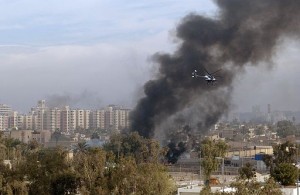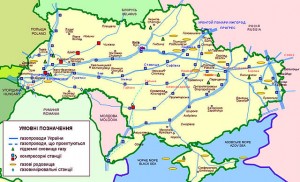
A Blackwater Security Company MD-530F helicopter in Baghdad, Iraq, 2004. Photo by Master Sgt. Michael E. Best (Public Domain)
On Sunday, May 11, there were a series of referendums held in Ukraine’s eastern Donetsk and Luhansk regions over secession from the rest of Ukraine. The pro-Russian separatists claimed overwhelming public support for secession. The United States said today that it doesn’t recognize the results, and called them “a transparent attempt to create disorder.”
Also on May 11, the German daily Die Welt reported that according to information leaked by sources in the Bundesnachrichtendienst (BND, the German foreign intelligence agency), there are over 100 American mercenaries operating in east Ukraine, and maybe as many as 400. Supposedly brought in by the current Ukrainian regime, these mercenaries are employees of the company named Academi. While you might not know the company under that name, you might recognize one of its previous names; Blackwater or Xe. Why should we be concerned about this?
Academi was founded under the name of Blackwater USA by Erik Prince, a former Navy SEAL. Its stated purpose was to provide training and support to military and law enforcement organizations. In a Congressional hearing of the Committee on Oversight and Government Reform in 2007, Prince stated “We are trying to do for the national security apparatus what FedEx did for the Postal Service.” After working with various SEAL and SWAT teams, Blackstone received their first government contract in October of 2000.
In 2002, Blackwater Security Company (BSC) was formed. BSC was a private “security” firm whose first contract was to provide 20 men with top security clearances to protect CIA headquarters and a base involved with the hunt for Osama Bin Laden.
There’s always been deep ties between the CIA and BSC; the founding Director of BSC (and Vice President of Blackwater USA at the time), Jamie Smith, was a former CIA agent, and the Vice Chairman from 2006 to 2008, Cofer Black, was the director of the CIA’s Counterterrorist Center (CTC) at the time of the 9/11 attacks. The vice chairman of intelligence for BSC until 2007 was Robert Richer, the former head of the CIA’s Near East Division. When Richer quit, he and Black started Total Intelligence Solutions, another Erik Prince company with deep links to BSC dealing with risk management and threat evaluation.
BSC received over $1 billion in government contracts that we know about (unclassified), dealing with providing “security” in places as widespread as Iraq, Afghanistan and, here at home, New Orleans after Hurricane Katrina. Where you’ve probably heard of them was from their actions in Iraq. In 2007, BSC’s name was changed to Blackwater International,
On September 17, 2007, the Iraqi government revoked Blackwater’s license to operate in the country after 17 Iraqi citizens were killed by Blackwater operatives, which prompted the Congressional hearing I referred to earlier. Four former Blackwater guards go on trial for first degree murder in June. Blackwater was also under investigation for arms smuggling, among other things. However, during this time, Blackwater was hired by the Department of Defense Counter-Narcotics Technology Program Office to provide support for counter-narcotics activities at a cost of up to $15 billion over five years. And, on August 19, 2009, Mark Manzetti reported in the New York Times that Blackwater had been hired by the CIA “as part of a secret program to locate and assassinate top operatives of Al Qaeda.” In January 2009, the State Department told Blackwater Worldwide that it would not renew its contract in Iraq, yet the CIA gave them a $100 million contract the next year.
In 2009, Blackwater changed their name yet again; to Xe Services LLC. In 2010, Erik Prince stepped down from the day to day management and moved to Abu Dhabi. Later that year, a group of private investors bought Blackwater/Xe’s training grounds and formed a new company named Academi. While supposedly having oversight and having new compliance rules, the board of directors lead us to believe it’s more of the same. Among the members are John Ashcroft, the Attorney General during George W. Bush’s first term and Bobby Ray Inman, who was the head of the NSA during the Carter administration and Deputy Director of the CIA for the first year of Ronald Reagan’s first term.
Academi has denied that they have contractors on the ground in Ukraine. But, going by past history, it’d be almost surprising if they didn’t, due to the deniability factor. The real question if they are there has to be who hired them. We the world’s people have the right to know.





![The guided missile destroyer USS Donald Cook (DDG 75) underway. Donald Cook was the first surface combatant to fire Tomahawk Land Attack Missiles (TLAM) in the liberation of Iraq. Photo By U.S. Navy photo by Chief Journalist Alan J. Baribeau. [Public domain], via Wikimedia Commons](http://occupyworldwrites.org/wp-content/uploads/2014/04/512px-US_Navy_030321-N-6141B-002_The_guided_missile_destroyer_USS_Donald_Cook_DDG_75_underway-196x300.jpg)
![Russian Air Force Jet SU-24. Photo By Alex Beltyukov - RuSpotters Team [CC-BY-SA-3.0 (http://creativecommons.org/licenses/by-sa/3.0), CC-BY-SA-3.0 (http://creativecommons.org/licenses/by-sa/3.0) or GFDL 1.2 (http://www.gnu.org/licenses/old-licenses/fdl-1.2.html)], via Wikimedia Commons](http://occupyworldwrites.org/wp-content/uploads/2014/04/512px-Sukhoi_Su-24M_Russia_-_Air_Force_AN2189597-300x199.jpg)
![Image By Peter Fitzgerald (:Image:Ukraine regions map.svg) [GFDL (http://www.gnu.org/copyleft/fdl.html) or CC-BY-SA-3.0-2.5-2.0-1.0 (http://creativecommons.org/licenses/by-sa/3.0)], via Wikimedia Commons](http://occupyworldwrites.org/wp-content/uploads/2014/03/1024px-Ukraine_regions_map-300x203.png)
![United States President Barack Obama and Russian President Vladimir Putin walk to the G8 Summit dinner following their bilateral meeting in Ireland on 17 June 2013. Photo by Pete Souza [Public domain], via Wikimedia Commons](http://occupyworldwrites.org/wp-content/uploads/2014/03/Barack_Obama_and_Vladimir_Putin_walking_in_Ireland-300x221.jpg)
![Events in Kiev on 2-18-14. Photo By Mstyslav Chernov/Unframe/http://www.unframe.com/ (Own work) [CC-BY-SA-3.0 (http://creativecommons.org/licenses/by-sa/3.0)], via Wikimedia Commons](http://occupyworldwrites.org/wp-content/uploads/2014/03/1024px-Clashes_in_Kyiv_Ukraine._Events_of_February_18_2014-4-300x200.jpg)
![By Mstyslav Chernov/Unframe/http://www.unframe.com/photographers/102-mstyslav-chernov.html (Own work) [CC-BY-SA-3.0 (http://creativecommons.org/licenses/by-sa/3.0)], via Wikimedia Commons](http://occupyworldwrites.org/wp-content/uploads/2014/02/1024px-Protesters_covered_with_improvised_shields_holding_the_barricade_line_at_Grushevskogo_str._Kyiv_Ukraine._Jan_22_2014-2-300x200.jpg)
![Syrian Za'atri Refugee Camp. Photo by U.S. Department of State [Public domain], via Wikimedia Commons](http://occupyworldwrites.org/wp-content/uploads/2014/01/1024px-An_Aerial_View_of_the_Zaatri_Refugee_Camp-300x183.jpg)
![Protestors in Kiev in November. Photo by Ivan Bandura (Own work) [CC-BY-3.0 (http://creativecommons.org/licenses/by/3.0)], via Wikimedia Commons](http://occupyworldwrites.org/wp-content/uploads/2014/01/512px-Protesover_EU_deal-200x300.jpg)